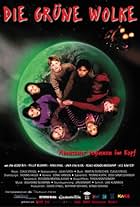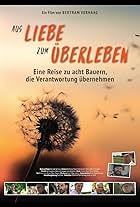Advanced search
- TITLES
- NAMES
- COLLABORATIONS
Search filters
Enter full date
to
or just enter yyyy, or yyyy-mm below
to
to
to
Exclude
Only includes titles with the selected topics
to
In minutes
to
1-48 of 48
- In only 15 minutes with some 30 people Jane Elliott manages to build up a realistic microcosmos of society today with all its phenomena and feelings. As already known from the ill reputed Milgram experiment, even participants who knew the "rules" are unable to remain uninvolved. What starts as a game turns into cruel reality which causes some participants' emotions to erupt with unforeseen intensity ...
- A shop in Munich's Westend. No vegetables are offered here, but culture.
- In a hermetically sealed-off safari park in Austria our civilization's moral challenges collide under a magnifying glass: guilt, responsibility, redemption. Fourty chimpanzees survived HIV experiments "serving mankind". Traumatized, highly aggressive and mentally isolated. Today four caretakers manage a unique rehabilitation project, where the victims learn how to become monkeys.
- 20091h 31mNot Rated8.0 (66)This is a documentary thriller about how Agro-Chemical multinational corporations victimize international scientists to prevent them from publishing their scary findings.
- A documentary to inspire a different way of thinking and living. Can organic agriculture really feed the world? Or must we continue to poison ourselves and destroy the soil with genetic engineering and artificial chemicals?
- Everyday life at the Dante secondary modern school is turned upside down when the pupils take over and decide what, how and indeed whether they want to learn. The experiment was originally planned for a single week, but it has rapidly grown from strength to strength. Headmaster Zander's ulterior motive had been to let the pupils find out for themselves that they would be at a loss to cope with so much freedom. The pupils however use their new scope to channel their energies into their own interests and develop a whole range of new ideas. The existing order at the school is completely reversed: the pupils demand that the teachers pay more attention to their own wishes, and even go so far as to mark the quality of the teaching. School becomes exciting again; whether it is hatching hens' eggs in biology or questioning grannies and granddads about the rise of National Socialism, the pupils enjoy it. But the potential success of the experiments is jeopardised by several factors: vindictive pupils depose Zander the Head and terrorise even the most well-meaning teachers. And among the teachers' ranks are a few who distrusted the whole exercise right from the start and now demand that Zander take a firm stand and put a stop to the disruption. But the headmaster has a hard task abolishing his own scheme.
- A strange green cloud has turned almost the entire human race into stone. The only survivors are eight children, their intrepid teacher Birnenstiel and his friend, a jolly millionaire, who by chance all happen to be in an airship above the green cloud at the time. Against this background Birnenstiel tells a bizarre adventure story in which he and the children are heroes. With loving and pointed irony he confronts his protagonists with deep-frozen beauty queens, gene-manipulated tomatoes, extraterrestrial maniacs, aggressive goldfish and last but not least the rampant mechanics of an abandoned civilisation which claims its victims one by one. When the narrator goes too far, the children take the story into their own hands...
- Im südlichsten Zipfel des Salzburger Landes - im Lungau - dem Sibirien Österreichs - betreibt der Land- und Forstwirt Sepp Holzer auf seinem Bergbauernhof eine Landwirtschaft der besonderen Art. Entgegen allen konventionellen Regeln hat er - trotz einer Jahresdurchschnittstemperatur von 4,5°C und einer Höhenlage zwischen 900m und 1400m - eine essbare Paradies-Landschaft geschaffen, und damit Furore gemacht. Ihm ist es in vierzig Jahren Naturbeobachtung, unerschöpflicher Experimentierfreude und Behördenkämpfen gelungen, seine Gegner von seiner naturnahen Bewirtschaftungsart zu überzeugen: "Vielfalt statt Einfalt denn alle Pflanzen und Tiere haben eine sinnvolle Funktion" so Holzer. Auf den Gebrauch von Pestiziden, Herbiziden oder Dünger wird gänzlich verzichtet. "Mit der Natur kooperieren, statt sie zu bekämpfen. Die Natur beobachten, und herausfinden, welche Pflanzen einander unterstützen." Das sind Schlüsselbegriffe für Sepp Holzer und Grundprinzipien der Permakultur. Seit 1962, als er den Hof seines Vaters mit 19 Jahren übernahm, betreiben Sepp Holzer und seine Frau ein perfekt funktionierendes Permakultur-System, ohne überhaupt von dem Begriff "Permakultur" gehört zu haben. Angelegt in Terrassen, ähnlich den Reisfeldern in Asien, unterscheidet sich sein 46h großes Land stark von den umliegenden Fichtenmonokulturen: Hier wächst vieles, was kaum jemand in einer Höhenlage von 1400m vermuten würde: von Kirschen, Äpfeln, Pilzen über Kiwifrüchten bis hin zu Zitronen, Kürbissen, Kartoffeln und Zuchinies. Überall sprießt und gedeiht die Natur. Entlang den Wegen, auf Terrassen, im Wald, auf extremen Steilhängen und sogar auf steinigem Boden. Innerhalb der Mischkultur befinden sich ca. 45 Wassergärten, Feuchtbiotope, Teiche und drei Bergseen. Hier züchtet der Biobauer seltene Fische, Kröten, Krebse und Wasserpflanzen. Seine Schweine beackern den Boden, eggen und düngen, und die Pflanzen sorgen gegenseitig für Feuchtigkeit, Stickstoff, und Gründünger. So hat Sepp Holzer weniger Arbeit und mehr Zeit, interessierter Besucher aus aller Welt über seine Mischkulturen aufzuklären.
- A film essay like the first words of a child: "Mama, Papa, Auto". The automobile is documented through the utilization of clip-montage as being a case of arrested development both ecologically and technically.
- The protagonists talk about their deepest feelings and symptoms such as dizziness and panic, their compulsion for washing or psychotic feelings of persecution in a refreshingly honest and trusting manner, or about everyday fears like the attempt to form their own opinions and the courage to think "egotistically" about themselves.
- The Bavarian Ministry for the Environment announces a hearing to discuss the final seal of approval for the Building of a nuclear power plant. 881000 people who have protested in writing against the building of this plant are "to be heard". The film documents the way in which, during this show of democracy, the last thread of genuine democracy is systematically debilitated and with it, the last remaining risk which could thwart the plans of the pro-atomic lobby.
- The average age of the employees at the Vita Needle Company, a needle factory near Boston, is an amazing 73 years. Anyone who can make it up the front steps gets hired. Full of joy and vitality, the elderly workers talk about the dream they all share: to be able to climb up the steps leading to the production hall for as long as possible!
- RUNAWAY tells the story of the fall of Lisa. Her parents only really want the best for her but the best is exactly what Lisa wants to keep for herself. She wants out, to get away. To thunder through the desert with a motor-cycle and her friend Maxie is her dream. Her parents are increa- singly suspicious of the unpredictable, often aggressive behaviour displayed by Lisa. Is their daughter on drugs? A deadly spiral of mistrust begins. Lisa really is suffering from withdrawal symptoms: Withdrawal from her dream. Maxie has let her down. Lisa's whole world has collapsed. She has changed. For her parents she appears to be quieter and more sensible. False harmony spreads throughout the family: A fatal misunderstanding, because Lisa's fall has only just begun...
- Film documents from the past five decades prove that the use of nuclear energy - whether for peaceful or for military purposes - was made socially acceptable only by repeatedly duping the population. "The Eighth Commandment" (thou shalt not bear false witness on thy neighbour) shows disturbing pictures of nuclear reprocessing plants, giving a sobering insight into the history of atomic power: from Otto Hahn to VEBA chief Benningsen-Voerder. From the first tests in the Nevada desert to the catastrophes of Three Mile Island in the United States to Chernobyl in the former USSR. From political speeches to the civil-war-like scenes at the nuclear power plants of Whyl, Wilster, Brokdorf and Wackersdorf.
- Documentary about how resistance to the Wackersdorf nuclear reprocessing plant in the Upper Palatinate has changed people.
- In Los Alamos New Mexico, Robert J. Oppenheimer and his staff created the first atomic bomb, "Trinity," the scientific prototype to "Little Boy" and "Fat Man," the bombs that hastened the end of World War II by leveling Hiroshima and Nagasaki. Although the laboratory is now a leading center of genetic research, it remains a place of secrecy, for its main mission is to maintain the existing nuclear arsenal, a task that hides behind the name, "Stockpile Stewardship." This film is about the history, heritage and horrors of the nuclear age in Los Alamos. The lab takes up forty-three square miles--indigenous land of the Tewa people from the pueblos Santa Clara and San Ildefonso. Consequently, the local Indians are cut off from their traditional shrines of worship. One of these sacred places contains the petroglyph of Avanyu, the mythic serpent that is the guardian of the springs. According to tribal wisdom, those who poison the water must face Avanyu's fiery revenge. The local ground water has been contaminated by decades of the laboratory's negligence. At the laboratory, formulas pull rank on myths. Warnings from the pueblos' spiritual leaders to laboratory officials fell upon deaf ears. Nothing disturbs the local air of denial like a little peaceful activism. Artists and activists meet at the Black Hole, a former supermarket that Ed Grothus calls home. Ed, an outspoken pacifist, resells lab salvage at the Black Hole. However, radioactive waste is never resold; instead, over decades, the laboratory covertly buried it in the ground. That's where former New Mexico EPA inspector Greg Mello comes in. With his peaceful Geiger counter, Mello has become the laboratory's most feared critic. The film also features former lab employees, Native American historians and environmentalists, artist Erika Wanenmacher, all of whom take a stand on behalf of the land and historical truth.








